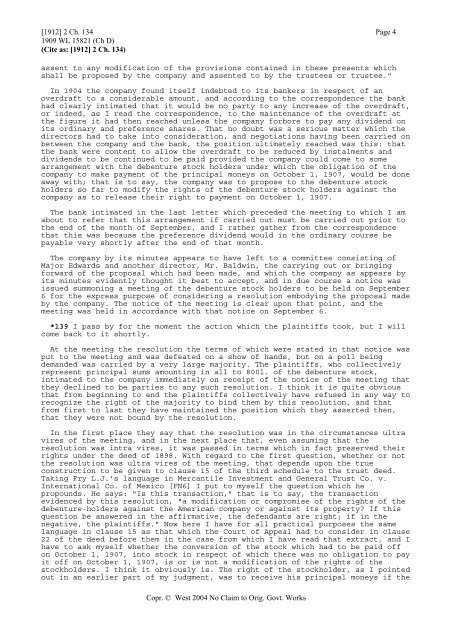Tesco v Constain - Thomson Reuters
Tesco v Constain - Thomson Reuters
Tesco v Constain - Thomson Reuters
You also want an ePaper? Increase the reach of your titles
YUMPU automatically turns print PDFs into web optimized ePapers that Google loves.
[1912] 2 Ch. 134 Page 41909 WL 15821 (Ch D)(Cite as: [1912] 2 Ch. 134)assent to any modification of the provisions contained in these presents whichshall be proposed by the company and assented to by the trustees or trustee."In 1904 the company found itself indebted to its bankers in respect of anoverdraft to a considerable amount, and according to the correspondence the bankhad clearly intimated that it would be no party to any increase of the overdraft,or indeed, as I read the correspondence, to the maintenance of the overdraft atthe figure it had then reached unless the company forbore to pay any dividend onits ordinary and preference shares. That no doubt was a serious matter which thedirectors had to take into consideration, and negotiations having been carried onbetween the company and the bank, the position ultimately reached was this: thatthe bank were content to allow the overdraft to be reduced by instalments anddividends to be continued to be paid provided the company could come to somearrangement with the debenture stock holders under which the obligation of thecompany to make payment of the principal moneys on October 1, 1907, would be doneaway with; that is to say, the company was to propose to the debenture stockholders so far to modify the rights of the debenture stock holders against thecompany as to release their right to payment on October 1, 1907.The bank intimated in the last letter which preceded the meeting to which I amabout to refer that this arrangement if carried out must be carried out prior tothe end of the month of September, and I rather gather from the correspondencethat this was because the preference dividend would in the ordinary course bepayable very shortly after the end of that month.The company by its minutes appears to have left to a committee consisting ofMajor Edwards and another director, Mr. Baldwin, the carrying out or bringingforward of the proposal which had been made, and which the company as appears byits minutes evidently thought it best to accept, and in due course a notice wasissued summoning a meeting of the debenture stock holders to be held on September6 for the express purpose of considering a resolution embodying the proposal madeby the company. The notice of the meeting is clear upon that point, and themeeting was held in accordance with that notice on September 6.*139 I pass by for the moment the action which the plaintiffs took, but I willcome back to it shortly.At the meeting the resolution the terms of which were stated in that notice wasput to the meeting and was defeated on a show of hands, but on a poll beingdemanded was carried by a very large majority. The plaintiffs, who collectivelyrepresent principal sums amounting in all to 800l. of the debenture stock,intimated to the company immediately on receipt of the notice of the meeting thatthey declined to be parties to any such resolution. I think it is quite obviousthat from beginning to end the plaintiffs collectively have refused in any way torecognize the right of the majority to bind them by this resolution, and thatfrom first to last they have maintained the position which they asserted then,that they were not bound by the resolution.In the first place they say that the resolution was in the circumstances ultravires of the meeting, and in the next place that, even assuming that theresolution was intra vires, it was passed in terms which in fact preserved theirrights under the deed of 1898. With regard to the first question, whether or notthe resolution was ultra vires of the meeting, that depends upon the trueconstruction to be given to clause 15 of the third schedule to the trust deed.Taking Fry L.J.'s language in Mercantile Investment and General Trust Co. v.International Co. of Mexico [FN6] I put to myself the question which hepropounds. He says: "Is this transaction," that is to say, the transactionevidenced by this resolution, "a modification or compromise of the rights of thedebenture-holders against the American company or against its property? If thisquestion be answered in the affirmative, the defendants are right; if in thenegative, the plaintiffs." Now here I have for all practical purposes the samelanguage in clause 15 as that which the Court of Appeal had to consider in clause22 of the deed before them in the case from which I have read that extract, and Ihave to ask myself whether the conversion of the stock which had to be paid offon October 1, 1907, into stock in respect of which there was no obligation to payit off on October 1, 1907, is or is not a modification of the rights of thestockholders. I think it obviously is. The right of the stockholder, as I pointedout in an earlier part of my judgment, was to receive his principal moneys if theCopr. © West 2004 No Claim to Orig. Govt. Works
















